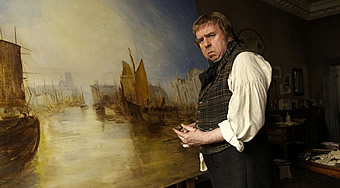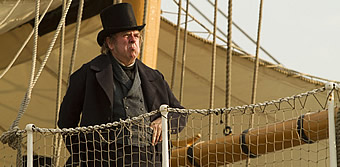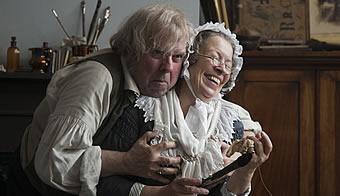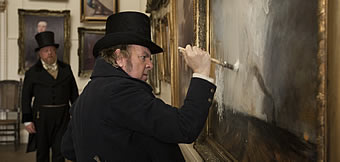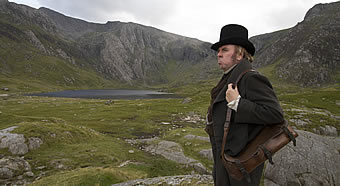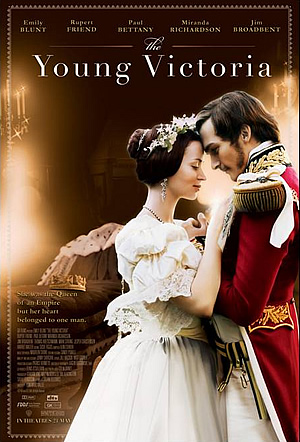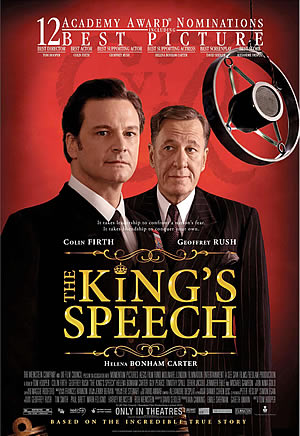MR. TURNER (2014)
Genre: Biography/Drama/History
Director: Mike Leigh
Cast: Timothy Spall, Lesley Manville, Tom Wlaschiha, Sinead Matthews, Roger Ashton-Griffiths, Richard Bremmer, Joshua McGuire, Robert Portal
RunTime: 2 hrs 30 mins
Rating: M18 (Sexual Scene)
Released By: Shaw
Official Website: http://sonyclassics.com/mrturner/
Opening Day: 8 January 2015
Synopsis: MR. TURNER explores the last quarter century of the great if eccentric British painter J.M.W. Turner (1775-1851). Profoundly affected by the death of his father, loved by a housekeeper he takes for granted and occasionally exploits sexually, he forms a close relationship with a seaside landlady with whom he eventually lives incognito in Chelsea, where he dies. Throughout this, he travels, paints, stays with the country aristocracy, visits brothels, is a popular if anarchic member of the Royal Academy of Arts, has himself strapped to the mast of a ship so that he can paint a snowstorm, and is both celebrated and reviled by the public and by royalty. …
Movie Review:
We must confess that our artistic inclinations before learning of this movie didn’t take us as far as the late British painter J.M.W. Turner, whose landscape paintings we’ve since discovered were acclaimed for their painstaking perfectionism. You’ll excuse us therefore if our knowledge of Mr Turner doesn’t go very much further beyond what writer-director Mike Leigh has depicted here or from what one can easily Google over the Internet; and yet while it may be tempting for cynics to associate a portrait of a painter with the metaphor of watching paint dry, we found ourselves quite entranced by Leigh’s measured and elegiac composition of the last quarter century of Turner’s life, a period when observers would say that he grew increasingly eccentric and controversial.
One of the surest signs of that is from the way he speaks. As rather unexpected of a member of the Royal Academy of Arts – which he joined at a then unprecedented age of 14 – Timothy Spall portrays Mr Turner as a laconic person who grunts, groans, spits and sputters in monosyllables than hold an actual conversation with anyone. When he sees his father after returning from a painting sojourn in the Netherlands, they growl and hug like a couple of bears – but it probably isn’t surprising that William (Paul Jesson) is his closest family member, whose relationship resembles more of a caretaker or personal assistant, a doting parent who indulges his son’s idiosyncrasies in order that the latter may be free to focus on his artistic pursuits.
Unlike many biopics which struggle to find defining points in their subject’s life and string a coherent narrative around them, Leigh is content to let his drama be loosely structured and freely flowing, and that means by the end of it, you’ll feel not only that you have seen the world as Turner did but also lived in that same universe. But boy what a contradictory world it is! Turner’s selfish and rather unbecoming manners are evident in the way he treats his timid housekeeper Hannah (Dorothy Atkinson), whom he uses as an absent-minded tool for his sexual urges, as well as his angry estranged mistress (Ruth Sheen), with whom he has two daughters and a grandchild that he refuses to regard as anything more than the occasional annoyance when they come knocking.
Leigh contrasts Turner’s brutish personality with his single-minded devotion to his art. His technique may test the patience of some viewers but Leigh insists on depicting Turner doing what all artists do in languorous fashion. And so, we see many scenes of Turner travelling around Europe often on foot searching for his subjects, closely observing light and weather, looking, pondering and making rapid sketches – but those who are more intimately associated with Turner’s artwork will certainly appreciate the real-life references to his celebrated paintings such as “Rain, Steam, and Speed — The Great Western Railway” and “The Fighting Temeraire”. Yet Leigh refuses to play up the more dramatic aspects of his life, so we don’t get clichéd shots of Turner painting feverishly nor for that matter more than a fleeting glance at Turner being strapped to the mast of a ship on his request to experience a massive thunderstorm.
Yet while it may unfold at a languid pace, there is more to Leigh’s film than just a series of vignettes from Turner’s life. It does take some contemplation, but Leigh makes the unmistakable point that his talents and shortcomings are inextricably linked together. Within his own Royal Academy of Arts fraternity, Turner provokes a kerfuffle by doing something with a dab of red paint that enrages his fellow member John Constable. His pragmatism is also shown in sharp contrast with the bitterness of his counterpart Benjamin Haydon (Martin Savage), and Turner shows himself to be a person very much in touch with reality, even to the point of inviting the naturalist Mary Somerville (Lesley Manville) to his studio to demonstrate how violet light alone can magnetise a needle.
By the end of his life however, Leigh illustrates how the tide had turned ever so slightly for the artist. As he aged, Turner’s paintings became more and more abstract, which a young Queen Victoria pronounced “vile” on her visit to the Academy. He stands helplessly as he watches his works lampooned at a music-hall revue. But most significantly, Turner shows a softer, more humane side of himself as he develops a close poignant relationship with a widow (Marion Bailey) at whose inn in Margate, Chelsea, he finds himself putting up at more and more during his final years; the seaside town is also the place where he had once visited as a lad and where he surprisingly seems to find a happiness we do not see elsewhere. Those who know Turner’s life history will also recall that it is in this Mrs Booth’s inn where he will pass, where he is also rumoured to have uttered his last words “the sun is God”.
And through a sprawling two-and-a-half hours, Timothy Spall inhabits the titular character through and through. There is no mystery why Spall was honoured Best Actor at the Cannes Film Festival for this role; for two years, the man spent preparing for it, including learning how to paint. His is a layered and multi-faceted depiction of a man complex, curmudgeon and capricious, and Spall is simply enthralling to watch. Complimenting Spall’s amazing performance is Dick Pope’s cinematography, working for the first time in digital to evoke the subject’s yellow-tinged landscape images in every single frame of the movie – and we would go as far as to say that Pope’s gorgeous visuals approaches Turner’s own artistry.
We won’t deny that ‘Mr Turner’ isn’t conventional viewing; certainly, Leigh’s choice of subject matter would most immediately appeal to a more literally-minded audience, even more so by his artistic choice to eschew the template of a conventional narrative. It is deliberately paced all right, unfolding no more (or less) dramatically than how its subject itself would have moved through the day-to-day of his life or savoured the beauty of nature. In one word, it is – as what most have used to describe Turner’s own artworks – sublime, but therein lies the beauty of this biopic.
Movie Rating:




(Elegant and lyrical, this beautifully photographed portrait of the late British painter is anchored by a stunning performance by Timothy Spall)
Review by Gabriel Chong
You might also like:
.jpg)
Movie Stills
